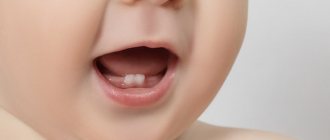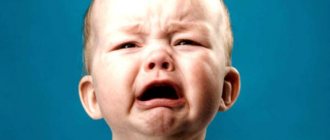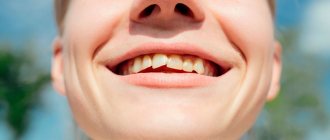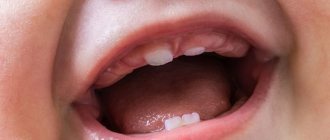Hypersalivation in children is a process of increased salivation that occurs both at night and during the day. Babies from 3 to 6 months suffer from the pathology, and parents must be attentive and immediately identify the problem, since in children the disease is subject to adequate treatment.
If symptoms of hypersalivation occur in adults, this condition is already considered pathological. A synonym for the disease is ptyalism; its etiology may be associated not only with increased activity of the salivary glands, but also with swallowing dysfunction. For what reasons does pathology occur in children and adults, how to identify and treat it in time - will be discussed today.
Choking on saliva: What are the causes and how to prevent it
Although choking on saliva happens to everyone from time to time, repeatedly choking on saliva can indicate an underlying health problem or bad habit.
Here's what you need to know about choking on saliva, including causes and prevention. Choking on saliva can occur if the muscles involved in swallowing weaken or stop functioning properly due to other health problems. Swallowing and coughing when you have not drunk or have a symptom of choking on saliva. You may also experience the following:
Sometimes choking on saliva may not be a cause for concern. But if it happens frequently, identifying the causes may prevent future occurrences. Possible causes of choking on saliva include:
Acid reflux
Heartburn can also irritate the lining of the esophagus. This can make swallowing difficult and allow saliva to pool in the back of the mouth, causing choking.
Other symptoms of acid reflux include:
Sleep associated with abnormal swallowing
This is a condition in which saliva accumulates in the mouth during sleep and then enters the lungs, leading to aspiration and suffocation. You may wake up gasping for air and choking on your saliva.
Lesions or tumors in the throat
Benign or malignant lesions or tumors in the throat can narrow the esophagus and make it difficult to swallow saliva, causing choking.
Poorly fitting dentures
Saliva production may slow down as your body adjusts to the dentures. If not, consult a doctor. Your dentures may be too high for your mouth or may not fit properly into your bite.
Neurological disorders
Treatment depends on the neurological disorder. Your doctor may prescribe medication to reduce saliva production and teaching techniques to improve swallowing. Medicines to reduce saliva secretion include glycopyrrolate (Robinul) and scopolamine, also known as hyoscine.
alcohol abuse
Choking on saliva can also occur after using heavy alcohol. Alcohol is a sedative. Consuming too much alcohol can slow down muscle response. Being unconscious or incapacitated from drinking too much alcohol can cause saliva to pool in the back of the mouth rather than flow down the throat. Sleeping with your head elevated can improve saliva flow and prevent choking.
Talking excessively
Saliva production continues as you say. If you talk a lot and don't stop swallowing, saliva can move down your trachea into your respiratory system and cause choking. To prevent choking, speak slowly and swallow between phrases and sentences.
Allergies or breathing problems
Other symptoms of an allergy or respiratory issue include:
9. Hypersalivation during pregnancy
This problem may gradually improve. There is no cure, but drinking water can help flush excess saliva from the mouth.
Drug-induced drooling
Some medications may also cause increased saliva production. These include:
You may also experience drooling, difficulty swallowing, and the urge to spit.
Talk to your doctor if producing too much saliva is causing you to choke. Your doctor may switch medications, change the dosage, or prescribe medications to reduce saliva production.
Source
Causes of nighttime salivation in children
To find out why a child is drooling, let’s consider the main reasons; they may be related to:
- psychological diseases;
- brain tumors;
- taking certain medications;
- viral diseases;
- stomatitis;
- the presence of parasites;
- stomatitis;
- damage to the central nervous system;
- diseases of the gastrointestinal tract.
In infants, increased secretion is considered normal, since the salivary glands have not yet formed. This may also be due to the fact that the baby has started teething. But still, if there is a lot of drooling, then it is worth showing the child to the doctor to exclude the development of pathologies. Too much saliva can cause problems with speech development. Therefore, it is necessary to show the child to a specialist who prescribes medications or decoctions to normalize the baby’s condition. You should not self-medicate without consulting a doctor and risk your child’s health. Herbal infusions and decoctions, if given thoughtlessly, can cause a serious allergic reaction.
I choke on saliva in my sleep
What causes salivation during sleep and what can you do about it? This is worth paying attention to!
Very often, the cause of increased salivation can be illness. This is how our body gives signals that something is going wrong. It would seem like a small thing, but it’s not entirely true.
Runny nose
Let's start with the simple and obvious. Very often drooling is due to a runny nose. At night, the nose gets stuffy, breathing becomes difficult and the person opens his mouth. This is where increased salivation begins. This problem will resolve itself when the runny nose goes away.
Infections in the mouth
Drooling occurs due to diseases of the oral cavity: inflammation of the mucous membrane, gums, caries or periodontal disease. Reproducing bacteria provoke the production, and therefore the release, of an increased amount of saliva. Always remember to take good care of your dental health.
Diseases of the gastrointestinal tract
Inflammation, increased acidity, flatulence - all this leads to excessive salivation at night. In such diseases, salivation works as a protective measure: saliva dilutes gastric juice and reduces acidity. These symptoms should not be ignored so as not to lead to cholecystitis or pancreatitis.
Helminthiasis
Yes, that’s right, it’s not a myth at all. Of course, drooling while you sleep is not a 100% guarantee of the presence of worms, but they may well be there. Worms cause a change in acidity, which, as we have already said, leads to excessive salivation. There is a reason to get checked, get tested or carry out preventive measures.
Nervous system diseases
The symptom may occur during cerebrovascular accident, during Parkinson's disease or with trigeminal neuralgia. The same phenomenon is typical for syringobulbia, polio, vascular pathologies and even oncology.
Endocrine system diseases
Excessive salivation may be a peculiar reaction of the neuroendocrine system to some irritant. It can occur as a result of stress or endocrine diseases (thyroid gland, pituitary gland, hypothalamus). Sometimes observed in diabetes mellitus.
Very often, nighttime drooling occurs due to bad habits. People who use drugs or smokers very often suffer from this unpleasant symptom. There is only one recipe - it's time to give up bad habits.
ADVICE
So what can you do to get rid of nighttime drooling? To begin with, we recommend understanding the reason for its occurrence. If there are no visible reasons, then this is a serious reason to go to the doctor.
To prevent nighttime drooling, you can try changing your sleeping position. If you fall asleep on your side, try to retrain yourself and start falling asleep on your back. If this does not help, you can try placing the pillow higher. Then the head will rise and the mouth will not open.
How to get rid of hypersalivation
It is important to visit a doctor in time for examination, to identify the cause of drooling and adequate treatment. To establish the exact cause, it is necessary to undergo a comprehensive examination. The doctor collects the patient’s life history, symptoms, his working conditions, the presence of bad habits and possible diseases. The dentist carefully examines the oral cavity and identifies diseases of the mucous membrane, teeth or gums. If the specialist did not find any abnormalities and it turned out that salivation is related to physiology, then salivation can be reduced thanks to:
- fighting bad habits;
- eliminating spicy and salty foods from the diet;
- drinking quince juice;
- rinsing the mouth with herbal decoctions - chamomile, oak bark and sage;
- trying to sleep on your back and not on your side;
- caring for the nasal cavity - before going to bed, it is advisable to rinse it with saline or sea water, breathe over essential oils (camphor or eucalyptus).
Can a baby choke on drool while sleeping: how to avoid the danger
Children under one year of age often experience increased activity of the salivary glands. This can be caused by various reasons: from teething to acute respiratory disease. The main thing is to correctly determine the cause of this condition. In most cases, this problem does not require treatment and goes away on its own.
Baby drooling is a common occurrence.
Causes of increased salivation at night
If a child chokes on saliva in his sleep, he should be moved from a position lying on his back to his side or stomach, then the mucus will not flow into the lungs, causing a cough. The problem is worse at night because:
This condition should not be considered a pathology; it is normal in children under one year of age.
The most common reason for the active formation of saliva is teething. Also, the volume of mucus secreted increases sharply when a child suffers from acute respiratory infections and acute respiratory viral infections. When the period of recovery begins, this condition passes. The baby begins to choke on saliva because mucus from the mouth constantly gets into the throat, and the baby does not have time to spit it out.
The most likely cause of the problem is active teething
Emergency help for choking on saliva
Parents often wonder whether a baby can choke on saliva and why this happens. This is really possible if the baby sleeps in a supine position. Also, a sleeping baby may choke when burping. To prevent this from happening, after feeding you should keep the baby in an upright position for about 15 minutes and only then put it in the crib.
What to do if the baby's temperature is 38 degrees
Emergency help may be needed if:
In these cases, parents must act correctly so as not to harm the baby.
If a baby chokes
If parents see that the child is choking on saliva, they need to give the baby an upright position as soon as possible.
A baby after six months who can sit can be placed on pillows to sleep in this position; Children up to two to three months are placed on their stomach.
If the baby cannot breathe, you need to take him by the legs, turn him head down and hold him in this position until he spits out mucus or a foreign body. This must be done quickly.
What not to do
When a child is choking and cannot clear his throat, parents should not be nervous, because anxiety always interferes with the correct action. Also, you should not slap the baby sharply on the back - this can push the mucus even further into the respiratory tract.
If the baby screams loudly, you should not interfere with this - with a scream, he can get rid of the abundance of saliva on his own. If there is increased salivation, the baby cannot be limited in liquid; on the contrary, he should drink as much as possible.
Acidic drinks (for example, cranberry juice) should be avoided - they provoke excessive saliva production.
Attention! You should not give your baby bagels or dryers instead of a teether. The baby may bite off a small piece and choke. All rattles with small parts inside that the baby takes into his mouth must be securely closed.
First aid must be provided quickly and correctly
When you need a doctor's help
Cough to the point of vomiting in a child - what to do if a baby is vomiting
If a child chokes on saliva in his sleep due to a runny nose, the snot flows down his throat and interferes with sleep. In this case, you should contact your pediatrician to prescribe antiviral drugs and vasoconstrictor nasal drops. You also need medical help if:
Typically, an infant begins a period of active drooling after six months, when the first milk teeth erupt. However, in some cases this time begins much earlier - at three to four months. In this case, it is necessary to bring your baby to the doctor, since premature appearance of teeth may indicate rickets and other diseases.
When the toddler turns one year old, the activity of the baby's salivary glands gradually slows down, but periodically resumes during the appearance of new pairs of milk teeth. At this time (up to 2.5 years), you should be especially attentive to the health and well-being of the baby and make sure that he does not suffocate from increased salivation during sleep.
Possible consequences and complications
What to do if your child is constantly sick
Situations when a child chokes on saliva are most often characteristic of acute respiratory diseases and the period of teething. There are usually no complications; any baby can choke or choke slightly, it’s not scary.
However, if a child chokes on mucus from a runny nose and finds it difficult to breathe, self-medication or improper treatment can lead to bronchitis (pneumonia). In this case, treatment with antibiotics will be required. If your baby starts coughing, you need to pay attention to this.
Constant contact of saliva on the chin of a newborn can lead to skin irritation: redness, itching, and discomfort.
In this case, it is recommended to lubricate the affected area with any moisturizing baby cream containing panthenol. Also, do not rub irritated skin with a towel.
If your baby begins to drool a lot, you can only gently blot it with soft cotton pads or a microfiber cloth.
Increased activity of the salivary glands is not a disease, but a normal physiological condition
The dangers of increased salivation during sleep
Hypersalivation is a phenomenon of increased salivation. And if this is a typical picture for young children, then in adults it can be a symptom of a serious disease.
Normally, much less saliva should be produced during sleep than during the day. Excessive salivation during sleep is a dangerous phenomenon: not only is it aesthetically unattractive, but there is also a danger of choking on saliva during sleep.
Sleeping on wet sheets is usually not fun either.
Why do you drool in your sleep?
In most diseases, increased salivation continues throughout the day, saliva is released both before sleep and during sleep, and saliva is observed abundantly after sleep.
In addition, a person experiences excessive salivation during sleep:
The causes of nocturnal hypersalivation may lie in the predominance of the parasympathetic nervous system (PNS) during sleep, which innervates the salivary glands. Under its influence, excessively liquid saliva is released.
However, there is also purely nocturnal drooling, which does not appear during the day. The most common causes of nighttime drooling are:
In some cases, a one-time night profuse salivation appears if a person is simply very tired, fell asleep soundly, completely relaxed, his mouth opened in his sleep and a little saliva flowed out.
It happens that due to strong muscle relaxation, saliva flows onto the pillow of a drunk person. You don't have to be an alcoholic to do this - it can happen to anyone.
Saliva is produced abundantly even after smoking - so if you smoke before bed and then quickly and very soundly fall asleep, it is quite possible that you will not be able to resist and saliva will spill onto the pillow.
Complications
Excessive drooling from the mouth affects the skin; a person sleeps for some time with his cheek on a wet pillow, so one of the unpleasant consequences may be a violation of the integrity of the facial skin or the appearance of an infectious pustular rash.
Normally, the body secretes one and a half to two liters of saliva per day. With severe drooling, a person can lose up to 10-12 liters of salivary fluid, which can lead to dehydration that is dangerous for the body. And, of course, there is incomparable psychological discomfort, stress and sleep disturbances.
Treatment
Treatment of increased salivation at night involves, first of all, diagnosing the causes that caused its occurrence and treating the underlying disease.
For diagnosis, you should contact a specialist: gastroenterologist, dentist, endocrinologist, neurologist, therapist. You need to undergo clinical tests and be checked for worms.
The specialist prescribes the necessary studies. Therapeutic treatment is selected by the doctor.
In some cases, medications with an anticholinergic effect (riabal, platifilin, scopolamine) are prescribed, which reduces the amount of saliva produced. However, you should not prescribe these drugs yourself, because side effects may occur.
In addition, drug therapy is usually short-term. And, of course, it is necessary to completely cure all diseases of the oral cavity.
Cryotherapy, a method that allows one to reflexively increase the frequency of swallowing saliva, and homeopathic treatment have proven to be quite effective methods.
In the most difficult cases, with excessive salivation, surgery is performed to remove large salivary glands.
However, this is a very complex operation that can cause a number of other problems: for example, if the facial nerves are damaged, the symmetry of the face is disrupted.
Injecting botulinum toxin into the parotid glands stops saliva production for up to 8 months.
List of used literature:
Treatment
The treatment process for hypersalivation in an adult is based on the results of examinations, and treatment includes the following points:
- Drug treatment aimed at normalizing the activity of the salivary glands - it includes drugs in the form of tablets and injections.
- Massage of the facial area - the most effective procedure is shown in patients who have experienced a stroke, because as a side effect they often experience dysarthria (pronunciation problems resulting from impaired innervation of the speech apparatus).
- Physiotherapeutic treatment - for hypersalivation, cryotherapy is used, this is a treatment using cold aimed at normalizing the swallowing reflex.
- Radiation therapy - allows you to block excessive saliva production by killing some part of the salivary ducts.
- The introduction of botulinum toxin helps to stop the excessive activity of glands and ducts for a period of 3 to 6 months.
Surgical treatment is used in the most advanced situations; it involves the removal of several salivary glands. Only a doctor can recommend surgical intervention after a thorough examination and the absence of positive results from conservative therapy.
Treatment in children
If signs of hypersalivation appear in a baby at an early age, they may not signal the development of any serious pathology, but simply indicate underdevelopment of the necessary muscles of the face and oral cavity. Also, a problem may arise if the child does not know how to swallow the saliva accumulated in the mouth in time - to solve it, you need to teach the baby to close his mouth while swallowing, as well as in those moments when he is not eating or talking.
If a child is busy with important work (classes at school, kindergarten, requiring prolonged conversation), he sometimes needs to stop to swallow liquid. More radical methods of treating pathology in children include the following methods:
- Cryotherapy. Parents apply pieces of ice along the contour of the oral cavity to the baby; they need to be held for as long as the child can withstand - up to 60 seconds in a row.
- Mouth rinse. It is best to use medicinal herbs that have a calming effect - lavender, mint, sea buckthorn leaves. You can also rinse your mouth with unsweetened jelly, kefir or mineral table water (Borjomi, Essentuki).
- Speech therapy massage. First you need to find the hole under the jaw, place your index finger in it and make vibrating movements. Then you need to feel two points under the tongue and gently massage them counterclockwise for about 10-15 seconds. The next movement is circular, in those places where the jaw closes behind the ears. First, you need to massage these points when the child’s mouth is open, then when it is closed. The procedure should be completed with a palate massage.
- Dieting. This item does not include any special set of products, the main thing is that the diet contains carrots, apples, crackers (solid food that promotes sufficient salivation and full teeth growth). Young children should be introduced to solid complementary foods in the form of cookies, meat, and crackers, so that their salivary glands learn to process not only milk and cereal.
- Articulation exercises. Let the child throw back his head and imitate swallowing, yawning, and chewing food. Then he needs to open his mouth wide and hold in this position for 5-10 seconds. Inflating and retracting the cheeks, holding light objects (strips of paper, threads) with the lips are useful. You can frame the exercises as a game - let the child blow air into a glass of juice through a straw or through a curled tongue.
Accustoming your baby to solid foods (apples, carrots) is not only the prevention of hypersalivation, but also problems with teething, gastrointestinal diseases, anemia
All these measures will help not only for treatment, but also for the prevention of hypersalivation in children, which is not accompanied by serious pathologies. If the problem occurs against the background of concomitant diseases, then the baby must be shown to a doctor for a thorough diagnosis. According to 80% of young mothers, symptoms of hypersalivation appear in their children at the age of 3–9 months, while the process of teething occurs, and then the symptoms disappear on their own.
Many parents who trust homeopathic doctors buy the drug Belladonna for their children; taking 1 pea three times a day helps to survive the teething process painlessly and reduce the amount of saliva produced. Signs of pathology in adults require examination by an experienced specialist who, if necessary, will refer the patient for consultation with specialist doctors, because increased salivation in adults and old age indicates serious diseases (if the symptom occurs regularly and not just once).








